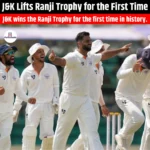Indian NGO Educate Girls wins Ramon Magsaysay Award 2025
|
General Studies Paper I: Important Personalities, International Recognition |
Why in News?
Indian NGO “Educate Girls” has been honoured with the “Ramon Magsaysay Award 2025”. The award recognises its commitment to empowering young girls through social participation.
Highlights of the Ramon Magsaysay Award 2025
- Date: The 67th Ramon Magsaysay Award ceremony has been scheduled for 7 November 2025, continuing its tradition of being observed in November each year.
- Venue: The award presentation will be hosted at the Metropolitan Theatre in Manila, Philippines. This location has become a symbolic space for the award over the years.
- Winners:
-
- Educate Girls (India): The non profit group Educate Girls, also known as the Foundation to Educate Girls Globally, has earned the distinction of being the first Indian organisation to win this honour. The organisation has been awarded for bridging the gaps in education for girls from underserved and rural backgrounds.
- Shaahina Ali (Maldives): Shahina Ali has received the award for her long-standing commitment to environmental protection and sustainability. Her leadership has brought forward community driven initiatives for safeguarding fragile ecosystems and marine biodiversity.
- Rev. Flaviano Antonio Villanueva (Philippines): Flaviano Antonio L. Villanueva has been recognised for his efforts in restoring dignity and hope to the homeless in Metropolitan Manila. His projects highlight the role of faith based and people centric initiatives in restoring environmental balance.
NGO ‘Educate Girls’: Vision, Journey and Achievements
- About: Educate Girls is a grassroots non profit organisation that strives to bridge the gender gap in education, especially in remote and underserved regions.
- The organisation uses a unique approach that blends community mobilisation with government partnerships.
- The group’s model is based on a simple idea: when the community takes ownership of a school, children—especially girls—are less likely to drop out.
-
-
- The organisation runs large-scale programmes in Rajasthan, Madhya Pradesh, and Uttar Pradesh, directly impacting thousands of villages and reaching millions of children.
-
- Founder: This initiative was founded in 2007 by Safeena Husain, a New Delhi–born social entrepreneur deeply committed to girls’ education.
- She studied at the London School of Economics and worked in several developing regions including South America, Africa, and Asia before returning to India.
- Safeena believed that gender inequality in education could not be solved by schools alone. It needed parents, teachers, local leaders, and volunteers working as one unit.
- Under her leadership, Educate Girls grew from a small pilot project in Rajasthan’s Pali district to an internationally recognised NGO.
- Objectives: The organisation has always worked with clear objectives that align with long term social change:
-
-
- Enrolment of out of school girls and ensuring their return to classrooms.
- Retention of students in government schools with continuous support.
- Improvement of learning outcomes for both girls and boys through specially designed teaching tools.
- Building community ownership so that education becomes a shared responsibility.
- Reducing gender inequality in rural areas by offering equal access to opportunities.
-
- Historical Background: The roots of Educate Girls can be traced back to a pilot programme in 2005–2006 under the Rajasthan Education Initiative.
- Safeena Husain and her team first worked with just 50 schools in Pali district. The project showed that mobilising communities could dramatically raise enrolment levels.
- In 2008, the organisation launched a 500 school pilot project with approval from the state government. Partners like UNICEF and Pratham Rajasthan supported the effort.
- The organisation reached more than 4,000 schools within five years. By 2013, Educate Girls had established itself as a large-scale movement.
- Over the years, the NGO experimented with innovative financing models. In 2015, it partnered with UBS Optimus Foundation to implement the world’s first Development Impact Bond (DIB) in education.
- Achievements: Educate Girls has crossed several milestones in less than two decades:
-
- The organisation has enrolled more than 750,000 girls back into schools since 2007.
- Its programmes have improved learning outcomes in literacy and numeracy for over 1.3 million children.
- More than 13,000 volunteers, known as Team Balika, work as change agents in their own villages.
- The NGO has reached 6.7 million beneficiaries across Rajasthan, Madhya Pradesh, and Uttar Pradesh.
- Retention rates of enrolled girls have consistently remained above 90 percent, showing the strength of its model.
- In 2020, Educate Girls was featured in the HundrED Global Collection, which highlights the world’s top 100 innovations in K-12 education.
- The NGO has created a generation of young female leaders through initiatives like Bal Sabha councils.
- The learning kits designed by the NGO, called Gyan Ka Pitara (Treasure of Knowledge), have transformed remedial education.
- The organisation and its founder have received multiple awards such as the WISE Prize for Innovation in Education (2014), the Skoll Award for Social Entrepreneurship (2015), and the NDTV Women of Worth Award (2016).
- In 2025, Educate Girls became the first Indian NGO to win the Ramon Magsaysay Award, often called Asia’s Nobel Prize.
What is the Ramon Magsaysay Award?
- About: The Ramon Magsaysay Award, created in 1957 and it was set up to celebrate the ideals and legacy of Ramon Magsaysay, the seventh President of the Philippines. He was remembered as a leader who lived by principles of honesty, dedication to public service, and practical idealism. The award seeks to preserve his legacy by recognising individuals and organisations across Asia who show similar qualities.
- The prize is often called the “Nobel Prize of Asia”, a title that reflects its global stature.
- It honours people and institutions who serve society with courage and without seeking personal recognition.
- Each recipient receives a medal, a certificate, and a cash grant, but the real value lies in the credibility and visibility that the award offers.
- Background: The establishment of the award was made possible with the joint efforts of the Rockefeller Brothers Fund in New York and the Philippine government. The Fund provided financial support.
- In May 1957, the Ramon Magsaysay Award Foundation (RMAF) was formed as a non profit body responsible for managing the award. The first board of trustees included seven prominent Filipinos.
- The first awards were conferred in 1958, marking the beginning of what is now widely regarded as Asia’s Nobel Prize.
- Since then, more than 300 individuals and organisations from different parts of Asia have received the honour.
- Fields of Recognition: The award has recognised contributions in multiple fields that directly affect society. Initially, it was divided into six broad categories. Five of them were discontinued in 2009.
-
- Government Service (1958–2008)
- Public Service (1958–2008)
- Community Leadership (1958–2008)
- Journalism, Literature and Creative Communication Arts (1958–2008)
- Peace and International Understanding (1958–2008)
- Emergent Leadership (2001–present): Introduced much later, this category continues today.
List of Indians who have received the Ramon Magsaysay Award
|
Recipient |
Year |
Category |
|
Vinobha Bhave |
1958 |
Community Leadership |
|
Chintaman Deshmukh |
1959 |
Government Services |
|
Amitabha Chowdhury |
1961 |
Journalism, Literature and Creative Communication Arts |
|
Mother Teresa |
1962 |
Peace and International Understanding |
|
Dara Khurody |
1963 |
Community Leadership |
|
Verghese Kurien |
1963 |
Community Leadership |
|
Tribhuvandas Patel |
1963 |
Community Leadership |
|
Welthy Fisher |
1964 |
Peace and International Understanding |
|
Jayaprakash Narayan |
1965 |
Public Service |
|
Kamaladevi Chattopadhyay |
1966 |
Community Leadership |
|
Satyajit Ray |
1967 |
Journalism, Literature and Creative Communication Arts |
|
Moncompu Sambasivan Swaminathan |
1971 |
Community Leadership |
|
M.S. Subbalakshmi |
1974 |
Public Service |
|
Boobli George Verghese |
1975 |
Journalism, Literature and Creative Communication Arts |
|
Henning Holck-Larsen |
1976 |
Peace and International Understanding |
|
Ela Ramesh Bhatt |
1977 |
Community Leadership |
|
Mabelle Arole |
1979 |
Community Leadership |
|
Rajanikant Arole |
1979 |
Community Leadership |
|
Gour Kishore Gosh |
1981 |
Journalism, Literature and Creative Communication Arts |
|
Pramod Karan Sethi |
1981 |
Community Leadership |
|
Chandi Prasad Bhatt |
1982 |
Community Leadership |
|
Manibhai Desai |
1982 |
Public Service |
|
Arun Shourie |
1982 |
Journalism, Literature and Creative Communication Arts |
|
Rasipuram Lakshman |
1984 |
Journalism, Literature and Creative Communication Arts |
|
Muralidhar Amte |
1985 |
Public Service |
|
Lakshmi Chand Jain |
1989 |
Public Service |
|
K.V. Subbanna |
1991 |
Journalism, Literature and Creative Communication Arts |
|
Ravi Shankar |
1992 |
Journalism, Literature and Creative Communication Arts |
|
Banoo Jehangir Coyaji |
1993 |
Public Service |
|
Kiran Bedi |
1994 |
Government Services |
|
Pandurang Athavale |
1996 |
Community leadership |
|
Tirunellai Seshan |
1996 |
Government Services |
|
Maheshweta Devi |
1997 |
Journalism, Literature and Creative Communication Arts |
|
Jockin Arputham |
2000 |
Peace and International Understanding |
|
Aruna Roy |
2000 |
Community Leadership |
|
Rajendra Singh |
2001 |
Community Leadership |
|
Sandeep Pandey |
2002 |
Emergent Leadership |
|
James Michael Lyngdoh |
2003 |
Government Services |
|
Shantha Sinha |
2003 |
Government Services |
|
Lakshminarayan Ramdas |
2004 |
Peace and International Understanding |
|
V. Shantha |
2005 |
Public Service |
|
Arvind Kejriwal |
2006 |
Emergent Leadership |
|
Palagummi Sainath |
2007 |
Journalism, Literature and Creative Communication Arts |
|
Mandakini Amte, Mr. Prakash Amte |
2008 |
Community Leadership Community Leadership |
|
Deep Joshi |
2009 |
Community Leadership |
|
Neelima Mishra |
2011 |
Emergent Leadership |
|
Harish Hande |
2011 |
Community Leadership |
|
Kulandei Francis |
2012 |
Emergent Leadership |
|
Anshu Gupta & Sanjiv Chaturvedi |
2015 |
Emergent Leadership |
|
Bezwada Wilson, Thodur Madabusi Krishna |
2016 |
Human rights activist, Carnatic music |
|
Bharat Vatwani, Sonam Wangchuk |
2018 |
Restoring health and dignity to troubled lives Education for community progress |
|
Ravish Kumar |
2019 |
Journalist (“Prime Time” show on NDTV) |
|
Dr R. Ravi Kannan |
2023 |
Recognition of initiatives in India such as people-centered cancer treatment in Assam |
|
NGO ‘Educate Girls’ |
2025 |
For bridging the gaps in education for girls from underserved and rural backgrounds |
Related Articles










